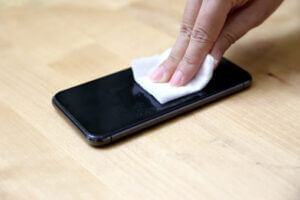Ways Germs Can Spread to Your Eyes (and How to Stop It)
Bacteria and germs are everywhere – in both “good” and “bad “forms. And, since they are so common, often times we don’t give much thought to germs, how they spread, or what surfaces they may live on. However, as many of us are becoming increasingly conscious of harmful bacteria that surrounds us during the COVID-19 pandemic, it’s important to know how germs can spread to the eyes, face, and mouth. With this in mind, here are four common ways germs can spread to your eyes and how to prevent them.
1. Contact with Contaminated Surfaces

Not sure the best way to clean your phone? Check out this article by techradar.com on cleaning for COVID-19 and more.
As you know, germs can be found everywhere (literally). That being said, one of the easiest ways germs can spread is through contact with contaminated surfaces. All-day long, you are touching surfaces where bacteria exist, whether that’s inside of your home or in public spaces. Some of these contaminated surfaces may include:
- Cell Phones
- Door handles
- Public Transportation
- Restrooms
- Clothing/Shoes
2. Airborne Germs
One of the most important reasons we should always cover our mouth and nose while sneezing is to limit the spread of airborne germs. Whether it’s a cough or sneeze, germs can spread quite easily through the air. In fact, the average sneeze sends droplets – that can carry germs for an array of infectious diseases – about six feet, according to The Center for Disease Control. Some common airborne germs include the common cold, the flu, chickenpox, measles, and more.
3. Touching Your Face
Since we all come into contact with contaminated surfaces regularly, it’s unsurprising that one of the easiest ways germs can spread to your eyes is by touching your face. And, with the average person touching their face approximately 23 times per hour, it’s very easy to introduce harmful bacteria to our body’s entry points, including our mouth, nose, and eyes.
4. Contact With Animals
Believe it or not, your furry, scaly, and feathered friends all carry germs on their skin, just like you do. And, when you’re handling an animal, it’s very easy to transfer germs from their skin/fur to your eyes. Whether that means touching your face with your hands or simply snuggling and loving on them.
How to Reduce the Spread of Germs
The good news is that’s it’s easier to stop the spread of germs than you might think. In fact, it’s all about practicing proper hygiene, including the following practices:
Avoid Touching Your Face – Because viruses, germs, and bacteria can live on surfaces for several hours or even days, it’s important to avoid touching your face at all costs. Whether you are suffering from allergies or have to swipe a piece of hair from your eyes, keep your hands off your face. Rubbing your eyes won’t help the situation and puts you at a higher risk of introducing germs to your body.
Wash Your Hands Regularly – This is a no brainer for most, especially with so much of the news discussing the recent coronavirus pandemic. Washing your hands multiple times throughout the day helps to keep germs at bay. That way, if you should touch your face, you are decreasing the chances of those contaminants entering your eyes.
Utilize Alcohol-Based Hand Sanitizer – When hand-washing isn’t an option, an alcohol-based hand sanitizer is a great alternative. Just remember, a little goes a long way. And, in most instances, hand washing is preferred as it is more effective against the removal of bacteria, such as norovirus.
Clean Your Bedding Regularly – When it comes to the spread of germs, bedding may not be your top of mind. However, take a moment and think about it. You may only change your bedding every two weeks or so, and during this time, you’re daily germs, dead skin cells and dust, have started to collect. So, what do the experts say? Wash your bedding once a week to be safe!
Small Actions Can Make a Big Difference
The thought of germs existing everywhere can be a scary realization. However, knowing that something as simple as practicing proper daily hygiene is reassuring. So, keep washing your hands, clean your home surfaces regularly, and, if possible, avoid contact with anyone who may be ill or showing signs of a fever. Even the smallest of actions can make a difference in your health and wellbeing.
Share
